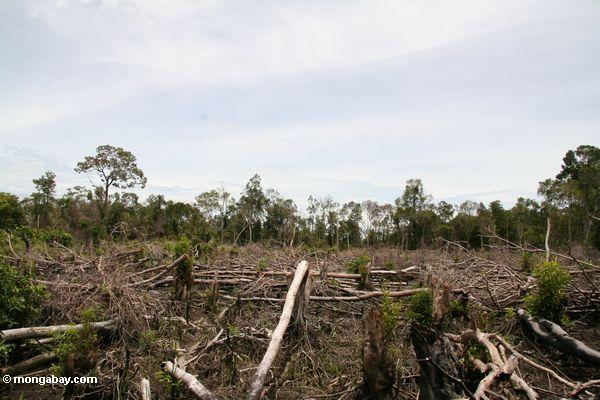Deforestation in Central Kalimantan. Photo by Rhett Butler.
Despite opposition from the powerful palm oil industry, Indonesia should extend its two-year moratorium on new logging and agricultural concessions in carbon-dense peatlands and forests, said a top forestry official.
Indonesia’s moratorium, which is set to expire this May, was signed in 2011 under a $1 billion climate change mitigation agreement with Norway. The moratorium has made 14.5 million hectares of peatlands and forests off-limits to new concessions. It aims to encourage agricultural expansion in degraded, non-forest areas which cover vast extents of Indonesia. But for now its fate is uncertain.
Hadi Daryanto, secretary general of the Ministry of Forestry, told Reuters that he hopes the moratorium would be extended.
“The ministry of forestry would like to continue the moratorium and provide degraded land for business,” said Daryanto. “We have had success with the moratorium.”
The moratorium has faced heavy criticism from both environmentalists and industries most closely associated with deforestation. Green activists have complained that loopholes in the moratorium allow companies to continue exploiting forests while the palm oil, pulp and paper, and logging sectors have balked at any measure that restricts their expansion.
The effect of the moratorium to date is uncertain. Unlike Brazil, Indonesia does not release regular updates of deforestation and forest degradation. Nonetheless the moratorium has ushered in a movement toward more transparency around land use and renewed scrutiny of enforcement of Indonesia’s environmental laws. Last year, in a case that was widely seen as a litmus test for Indonesia’s willingness to enforce the moratorium, a court revoked the operating permit of a palm oil company found to be flagrantly violating the moratorium by clearing protected peatlands in Sumatra.
Still deforestation and forest degradation account for the bulk of Indonesia’s total emissions. If the country hopes to meet its 2020 target for reducing emissions, it must move toward curtailing conversion of peat swamps and rainforests for plantations.
Related articles








